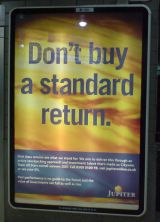 Regular readers will be worried I’ve been spending too much time in Sainsbury’s lately. No worries – I also get to enjoy the exciting surrounds of Reading station twice a day, every day.
Regular readers will be worried I’ve been spending too much time in Sainsbury’s lately. No worries – I also get to enjoy the exciting surrounds of Reading station twice a day, every day.
Amongst the commuting hordes, school children and free newspapers (incidentally, is it only me who finds these an insidious nuisance?) I have spotted the occasional piece of good copy.
This poster is one of them. The advert’s for Jupiter Asset Management.
They’ve obviously worked out that their target demographic passes through the station. And their copywriter’s thought up a decent line which is both appropriate to the setting and makes you want to read futher.
‘Don’t buy a standard return’ – nice work.
It’s no secret that the subject line of an email newsletter can have a big impact on the open rate. Give people a compelling reason to open the thing, and usually they will.
However, if the subject promises more than the email actually delivers then you’ll shoot yourself in the foot: a big open rate, yes. But a high unsubscribe rate too.
This isn’t exactly the cutting edge of online marketing. So it’s surprising that some companies do email so badly.
Here’s an example. I entered two ballots to purchase tickets to gigs recently, I wasn’t confident of success. But like entering a competition, it seemed worth a go.
One was for Hard-Fi’s album launch tour – a series of gigs in tiny venues a couple of months back. The other was just a day or so ago, to get in on the presale for XFM’s Winter Wonderland, a Christmas fundraising concert featuring some big names.
I got emails back from both saying I’d been unsuccessful. The subject line from XFM? ‘Winter Wonderland Pre-Sale Commiserations‘. Upfront and honest – I knew straight away that I hadn’t been lucky.
But the Hard-Fi one was pretty misleading: ‘Important Ticket Information‘. So it’s ‘important’, eh? Must be good news.
Er… no. In fact, it was completely unimportant, because I hadn’t been successful and therefore didn’t have to rush to buy my allocated tickets before a deadline.
I was annoyed – and not just because I didn’t get tickets. (Their recent singles have been rubbish actually, so it might’ve been a blessing in disguise.)
This kind of hopeless choice of subject line crops up again and again, on all sorts of emails.
So next time you write to customers, prospective customers or, well, anyone really, think about the subject line. It’s the first thing people see, so it needs to have the right impact:
- Don’t overpromise. People hate it when they feel deceived. If there isn’t anything inside the email to make it worth opening, then don’t send it.
- Keep it short. Many email clients and webmail services will chop the end off long subject lines, so get to the point fast.
- Think about including your company or brand name. People these days are really switched on to spam and other email threats, so you need to reassure them if you can.
There’s not much more to it than that. Be realistic, do an honest job of selling what’s inside and watch your open rate soar.
I seem to get lots of mediocre newsletters in my email. You know the sort of thing – you register with a website, choose to receive their newsletter and maybe look at it once or twice before your brain learns to ignore it when it appears in your inbox.
I signed up to Maxïmo Park‘s mailings because they’re one of my favourite bands. And their regular missives have been genuinely refreshing. Record labels tend to use bands’ newsletters to plug other groups – and they do it without much subtlety.
Maxïmo Park are a bit different, as they seem to want to really connect with their fans through the newsletter. The latest has lots of information about their tour, but it’s rather endearingly presented in a slightly rambling way:
As always we have sneakily kept some tickets back until the last minute, so if you click on the appropriate links you can try and get hold of said tickets so you can come to our Doncaster and Newcastle Arena shows. Speaking of Newcastle Arena we have still to announce the special guests so if the tension is getting too much, sorry, but I guarantee we are way more tense than you!
Ok, it’s not exactly the snappiest copy ever written. But it’s signed off by Lukas, the band’s keyboardist. And you know what? I reckon he might actually have written it.
When your target audience is a group of fans who really want to know what they band’s about, that authenticity is more important than anything. I think that goes for most newsletters. If you sound genuine, you’ll get more people clicking through to find out more. And more of those people will probably buy from you.
And of course the best way to sound genuine is to be genuine. Try to fake it and your subscribers will see straight through you.
 Regular readers will be worried I’ve been spending too much time in Sainsbury’s lately. No worries – I also get to enjoy the exciting surrounds of Reading station twice a day, every day.
Regular readers will be worried I’ve been spending too much time in Sainsbury’s lately. No worries – I also get to enjoy the exciting surrounds of Reading station twice a day, every day.